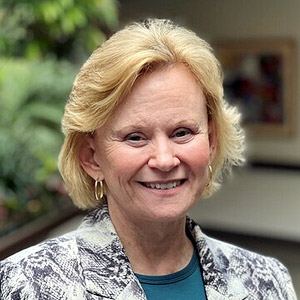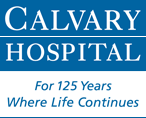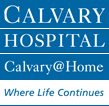A Career in Palliative and End-of-Life Care Can Be Just the Beginning You’re After
by Betty Nelson, Ph.D. RN

Calvary’s Betty Nelson, Ph.D. RN, director of the CalvaryCare® RN Residency Program, talks candidly about sector-wide nurse shortages and why palliative/end-of-life care is becoming increasingly attractive to recent graduates and mid-career nurses.
[Listen to Dr. Nelson’s conversation on the WCBS Health and Well Being Report with host Pat Farnack for more about the nursing shortage and Calvary’s response to attract and educate more professionals to Palliative and End-of-Life Care.]
Calvary is truly a special place, not just because it cares for patients at the end of life and provides unmatched palliative care, but because of the people who do this work. It’s in their DNA; I can feel it when I walk through the door every day.
Every role, whether it’s the housekeeping staff, the dietary staff and nursing staff, medical staff, the finance people… I mean, how many accountants do you know would first talk to you about patient care? They do that here.
In other ways, though, we’re no different than any other hospital or health system across the country: we’re dealing with a nursing shortage.
I’ve been a registered nurse for over 40 years and there’s been a nursing shortage on and off for decades (Read Betty’s bio) And what it comes down to is pure and simple supply and demand, and demand changes over time. It changes based on advances in medical science, changes in nursing care, shifts in demographics, and different expectations among our citizenry of the healthcare system itself.
Today, we have this embarrassment of riches in the United States in terms of scientific expertise, which allows us to have a longer lifespan. At the same time, because of a change in demographics, there are more of us becoming older, and we have raised expectations regarding the quality of healthcare available to us when we need it.
The shortages occur because the demand is higher than our capacity to meet it. Schools of nursing, for example, have faculty shortages and are challenged to find clinical placements for their students because hospital units are closed. And they’re closed because there are not enough nurses to staff units. It’s quite it interrelated cycle.
There are also a tremendous amount of nurses who are retiring at the moment. One study I’m familiar with shows that as a result of the pandemic more bedside nurses want to leave direct patient care. An additional 20% are looking to retire due to their age and years of service. Yet, the Bureau of Labor Statistics is saying there’s a need for around 195,000 nurses next year.
Being a palliative and end-of-life nurse
There are plenty of skilled nurses who have plenty of compassion. The question is whether they feel empowered or comfortable sharing it with others. Having an interdependent relationship caring for people at a vulnerable point in their lives requires extraordinary compassion and the ability and willingness to share deeply. It takes a lot of courage and bravery to physically and emotionally care for others when they’re at their most vulnerable. And you have to be able to do this while maintaining your wellness.
Today many nurses are having fewer interpersonal, direct human connections and more communication and interaction with and through technology. Technology, of course, will have an increased role in our well-being and the care we provide to others, even in our specialized field. But we need to think about how human care will be organized with technology in the future; what models will ensure safe, high-quality, sensitive care, which should always be expected and delivered.
The healthcare sector has reconsidered how to care for patients with chronic diseases through population-based models. We have opportunities, I think, to reimagine how we deliver care, not just how we diagnose and treat with science and medicine. We can redefine professional roles for example. That’s exactly what happened in the development of the nurse practitioner 20 years ago as physicians became specialized.
So we’re not unfamiliar with the concept of change; we, as nurses, need to reimagine our response and understand that expectations change, generation by generation.
So what can we do today? Well, if we look at nurses in general, we are of different ages and from different backgrounds. We have different needs at different points in our careers and lives. We have young nurses, who are enthusiastic and they’re trying to build a career and we have nurses who are in their middle stages of live life they have school children and they’re caring for elderly parents.
Now, why is this important for a hospital to healthcare employer, like Calvary, to know and appreciate? Because they need to be responsive to nurses’ specific needs. This is not a difficult thing to do, but it’s sophisticated, and it means looking at workloads, leadership, and the working environment too.
Nurses want to thrive in a place that is respectful, honest, transparent, and responsive to their patient’s needs and their own. They want an organization that is looking at the worker and providing a balanced, fair, dignified employment experience.
[Listen to Dr. Nelson’s conversation on the WCBS Health and Well Being Report with host Pat Farnack for more about the nursing shortage and Calvary’s response to attract and educate more professionals to Palliative and End-of-Life Care.]
Categories
Archives
- June 2025
- May 2025
- April 2025
- March 2025
- February 2025
- October 2024
- August 2024
- July 2024
- May 2024
- April 2024
- March 2024
- February 2024
- December 2023
- November 2023
- October 2023
- August 2023
- July 2023
- June 2023
- May 2023
- April 2023
- March 2023
- January 2023
- December 2022
- October 2022
- August 2022
- July 2022
- June 2022
- April 2022
- March 2022
- February 2022
- January 2022
- October 2021
- September 2021
- August 2021
- July 2021
- June 2021
- May 2021
- April 2021
- March 2021
- February 2021
- December 2020
- November 2020
- October 2020
- September 2020
- August 2020
- July 2020
- May 2020
- April 2020
- March 2020
- February 2020
- January 2020
- December 2019
- November 2019
- October 2019
- September 2019
- August 2019
- July 2019
- May 2019
- April 2019
- March 2019
- February 2019
- January 2019
- December 2018
- November 2018
- October 2018
- September 2018
- August 2018
- July 2018
- June 2018
- May 2018
- April 2018
- December 2017
- November 2017
- October 2017
- September 2017
- August 2017
- July 2017
- June 2017
- May 2017
- April 2017
- April 2012

